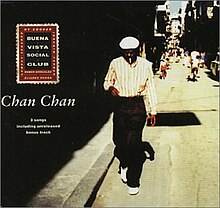Chan Chan (song)
| "Chan Chan" | ||||
|---|---|---|---|---|

UK single cover for "Chan Chan"
|
||||
| Single by Buena Vista Social Club | ||||
| from the album Buena Vista Social Club | ||||
| Released | September 16, 1997 | |||
| Format | CD | |||
| Recorded | March 1996 | |||
| Genre | Son | |||
| Length | 4:16 | |||
| Label | World Circuit Nonesuch Records |
|||
| Songwriter(s) | Compay Segundo | |||
| Producer(s) | Ry Cooder | |||
| Buena Vista Social Club singles chronology | ||||
|
||||
"Chan Chan" is a 1987 son composition by Cuban trovador Compay Segundo. In the late 1990s, it became the signature track of the Buena Vista Social Club project. The lyrics of the song revolve around two central characters called Juanica and Chan Chan.
"Chan Chan" was written in 1987, becoming one of Compay's last compositions. Although the song had already been recorded by the composer himself various times, worldwide success came with a version featuring Eliades Ochoa on lead vocals, accompanied by Ibrahim Ferrer as part of Buena Vista Social Club. The song was the first track on their eponymous album.
On the composition of the song, Compay Segundo said:
I didn't compose Chan Chan, I dreamt it. I dream of music. I sometimes wake up with a melody in my head, I hear the instruments, all very clear. I look over the balcony and I see nobody, but I hear it as if it was played on the street. I don't know what it can be. One day I woke up hearing those four sensitive notes, I gave them a lyric inspired by a children's tale from my childhood, Juanica y Chan Chan, and you see, now it's sung everywhere.
The most complete explanation says: 'The song relates the story of a man and a woman (Chan Chan and Juanica) who are building a house, and go to the beach to get some sand. Chan Chan collects the sand and puts it on the jibe (a sieve for sand). Juanica shakes it, and to do so she shakes herself, making Chan Chan aroused. [...] The origin of this tale is a farmer song learnt by Compay Segundo when he was twelve years old.'
The chorus of the song has a faster tempo than the rest of the song. The lyrics are as follows:
De Alto Cedro voy para Marcané
Llego a Cueto voy para Mayarí
From Alto Cedro I go towards Marcané
I get to Cueto, head for Mayarí
The four mentioned locations (Alto Cedro, Marcané, Cueto and Mayarí) are towns near each other in the Holguín Province on the east side of Cuba. It is a common practice in son cubano to mention Cuban toponyms, as in the 1952 standard "Alto Songo".
...
Wikipedia
